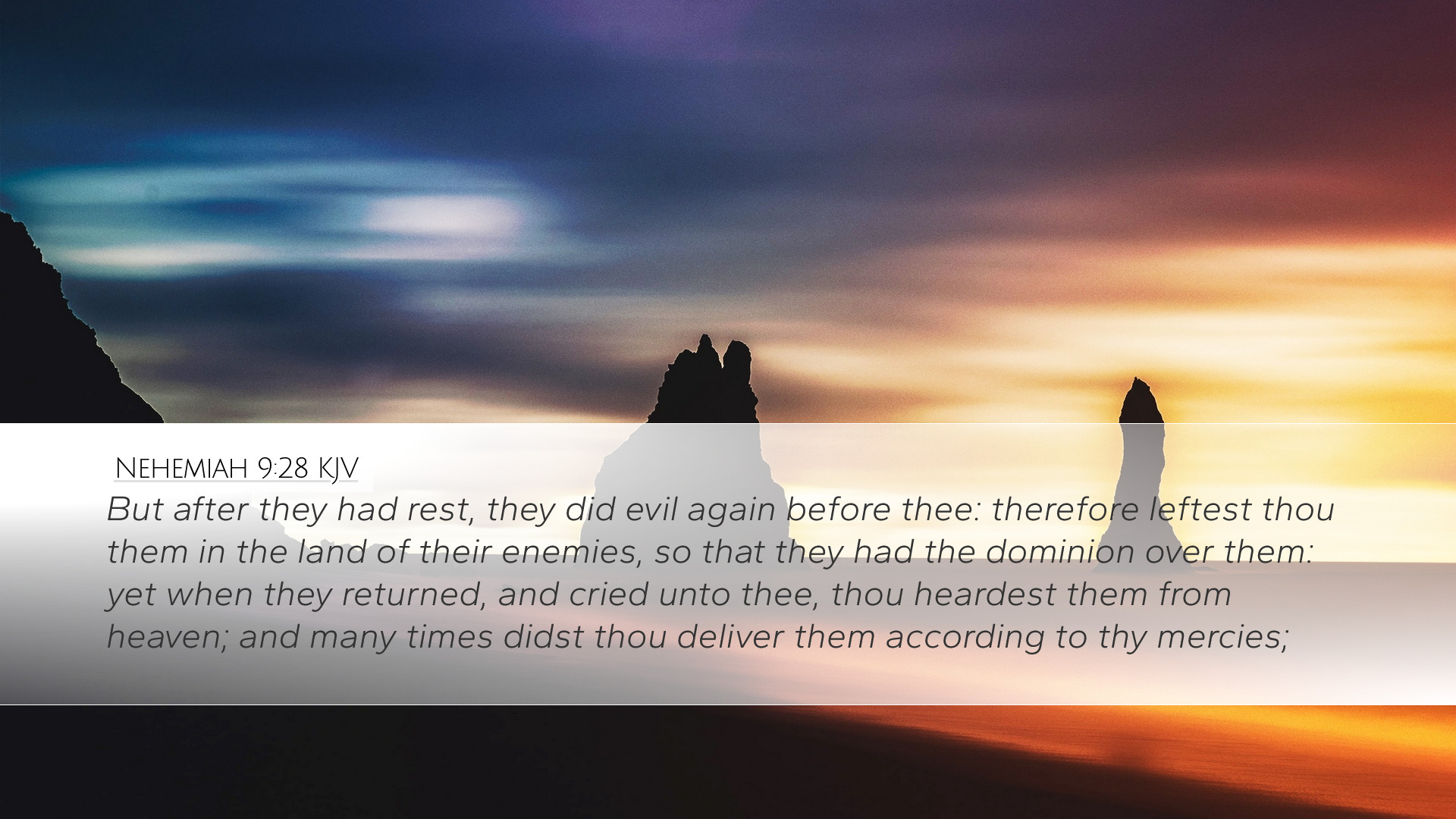Commentary on Nehemiah 9:28
Verse Overview:
Nehemiah 9:28 states: “But after they had rest, they did evil again before thee: therefore leftest thou them in the hand of their enemies, so that they had the dominion over them: yet when they returned, and cried unto thee, thou heardest them from heaven; and many times didst thou deliver them according to thy mercies.” This verse encapsulates the cyclical pattern of Israel’s history, illustrating themes of rebellion, divine judgment, repentance, and divine mercy.
Historical Context
The context of Nehemiah presents a post-exilic setting where the Israelites are reflecting on their covenant relationship with God. This chapter, which is part of a prayer of confession, recounts the history of Israel's disobedience and God's faithfulness, focusing on the narratives of sin and redemption. The mention of their enemies reminds the readers of the consequences of straying from the covenant.
Insights from Public Domain Commentaries
Matthew Henry's Commentary
Matthew Henry emphasizes the unchanging nature of God’s mercy despite the people’s repeated failures. He notes that after moments of relief or rest, the Israelites often fell back into sin. Henry reflects on the nature of humanity's forgetfulness in spiritual matters, suggesting that the ease and comfort provided by God were often met with ingratitude. He states:
“Sin is the ruin of nations, and the prosperity of God’s people is the means of their apostasy.”
Henry points out that the repetitive cycle of sin and repentance shows both human frailty and divine compassion. He encourages readers to recognize the nature of repentance and the importance of returning to God, stressing that God did not abandon his people but continually offered them restoration.
Albert Barnes' Commentary
Albert Barnes provides a theological exploration of the verse, focusing on the idea of divine justice juxtaposed with mercy. He explains that the phrase “leftest thou them in the hand of their enemies” highlights God’s righteous response to disobedience. Barnes also remarks on the concept of divine silence during times of sin, noting that it serves both as punishment and a call for the sinner to reflect on their actions:
“God’s silence is not absence; His absence is part of His governance over human affairs.”
This commentary illustrates the dynamic of God’s relationship with Israel and urges readers to consider their own spiritual state. Barnes expounds on the notion that God’s willingness to hear the cry of His people underscores the abundance of His mercy.
Adam Clarke's Commentary
Adam Clarke delves into the nuances of repentance as expressed in Nehemiah 9:28. Highlighting the cyclical nature of Israel’s behavior—first serving God, then turning away, and finally returning—he notes:
“Repentance is not only an inward change but an active turning back to the source of salvation.”
Clarke emphasizes that the act of crying unto God in times of distress signifies a recognition of their need for divine intervention. He cautions against complacency after receiving divine mercy, suggesting that genuine repentance will naturally lead to faithfulness.
Theological Implications
This verse underscores several key theological concepts significant to both individual believers and the corporate identity of the church:
- The Cycle of Sin and Redemption: The recurring pattern of sin among God’s people illustrates a profound truth about human nature and the desperate need for divine grace.
- God’s Faithfulness: No matter how many times the Israelites turned away, God remained ready to forgive, displaying a steadfast love that is a cornerstone of biblical theology.
- The Call to Repentance: This passage serves as a reminder of the importance of returning to God in times of distress and maintaining an active faith that remembers God’s past mercies.
- Divine Disciplinary Actions: It affirms the principle that God’s discipline, while painful, is a means to bring His people back into fellowship with Him.
Application for Pastors, Students, and Theologians
The implications of Nehemiah 9:28 extend beyond historical narrative to offer practical guidance:
- For Pastors: This passage is a poignant reminder to encourage congregations to stay vigilant against complacency and to remain faithful in their walk with God.
- For Theological Students: The depth of this verse invites deeper theological reflection on the character of God and the nature of sin, encouraging students to engage seriously with these issues.
- For Scholars: This text presents rich material for exegesis, inviting scholars to consider the historical, cultural, and theological contexts that shape its meanings.
Conclusion
In summary, Nehemiah 9:28 offers a profound reflection on humanity’s relationship with the Divine, marking an essential reminder of the nature of sin and the incredible mercy of God. The insights provided by esteemed theologians like Matthew Henry, Albert Barnes, and Adam Clarke illuminate a path towards understanding both historical contexts and spiritual implications. Emphasizing the importance of repentance and continual return to the merciful God, this passage serves as a guiding light for believers in all stages of faith.


